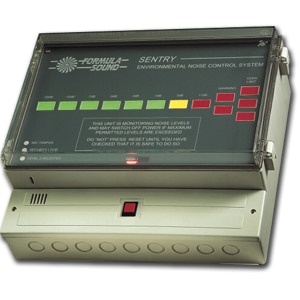The use of Sound limiters is becoming more and more frequent, and they are starting to be installed in venues right around the country. There are a lot of theories on why their use is on the rise but, safe to say, it looks like they are going to be around for a while.
Limiters can cause a very tricky situation – not just for the band, but the venue staff and even the client as well. Below is some helpful advice to address some of the key issues, from everyone’s point of view.
If there is one golden rule to take away from this, it’s that everyone is there for the same thing – to have a great time. Both the band and the venue are out to entertain the audience, and the audience is out to be entertained… so when dealing with limiters and volume restrictions, common ground can always be found!

What is a Sound Limiter?
For those of you lucky enough to have never encountered a limiter, their function is fairly universal – monitor the level of noise and volume of music.
Noise is measured in DB (Decibels) and if the level of volume exceeds a predetermined DB limit, then limiters can not only inform, but take action. Usually, there will be a visual representation based on a traffic light-style system.
Green is acceptable, orange is a warning that you are approaching the limit and then red – at this point, you might only have a couple of seconds before the limiter cuts the power to the mains! Power will usually be restored after around a minute or so, but some increase this blackout time if triggered more than once.
Know your decibels…
The reasons that sound limiters are fitted will vary. Some city centre venues will have had neighbours make complaints to the local council about noise pollution, and will subsequently be ordered to have them fitted. Some historic wedding venues (that may not have traditionally had live music on) will have had them fitted to prevent structural damage. Hotels with function rooms will have a lot of guests on site trying to sleep… The list goes on and on.
Below are some hints and tips about how to best navigate the situation. As a general rule, this is written with the idea that the performance is a wedding or similar function, but that doesn’t mean the following won’t be applicable to bands performing original music as well.
Lastly, try not to just skip to the section that applies to you – empathizing with all the parties involved is going to help defuse any tense situation before it even gets underway. And failing that, understanding ones enemy is a fine art…
Sound Limiter Advice: For The Venue
If you have a limiter, tell the client when they make the booking and inform the band on arrival – If you know the client is planning to have live music, make them aware that there is a sound limiter or volume restriction in place. Encourage them to tell the band or entertainment agent they are dealing with.
If the band knows that a limiter is in place, they can prepare accordingly (if it is a particularly low noise limit, they may change equipment, the instruments they choose to bring or possibly even their set list).
This is infinitely better than having to surprise a band with that fact on arrival, but if for some reason the message doesn’t get through, try to be polite and explain the situation clearly.
Be present at soundcheck – We know you’re going to be busy dealing with a million different things on the day of the event, but if you can find 5 minutes while the band are soundchecking to come and make sure everything is at an acceptable level and help them with any limiter problems, its going to be a lot better than coming up and asking them to change settings mid performance.
Remember, sudden power cuts can potentially ruin very expensive equipment – If your limiter does cut power to the mains, this must be an absolute last resort. Some musical equipment is not only expensive, but could potentially be very old. In some cases, you could be talking about equipment built well over 40 or 50 years ago.
Valve based technology in particular, like guitar amplifiers, can be very temperamental and sudden outages of power can cause all sorts of problems.
Musician’s aren’t all about playing at ridiculous volumes – Now this may seem like an obvious thing to say, but sometimes I do get the sense from some venue owners that they’ve had some bad experiences with bands before and now paint us all with the same brush.
The best thing to remember as a venue owner (especially if you are catering for weddings and functions) is that the type of bands you are going to be getting through will more often than not consist of highly trained professionals.
Many will have studied music at universities or colleges, and spent years honing their craft. As such, they are perfectly prepared to deal with you on a professional basis – If you have a sound limiter, inform them on arrival and work with them to navigate the situation as best you can.
Don’t just assume all musicians are Jack Daniels swigging Rock N Roller’s looking to play Motorhead and Metallica covers all night! (We need to retain our hearing just as much as you!)
Try to be reasonable and accommodating – We completely understand your job is really stressful. But please remember, musicians are working professionals too.
We are there to carry out our jobs to the best of our ability, and with a sound limiter in place, our job just got twice as hard. The more empathy you can have, the better… we will show you the same courtesy!
Sound Limiter Advice: For The Band
Kill it with kindness – This is first on the list for good reason! Everyone knows how frustrating it is to have to work within a volume limit, but remember, this isn’t necessarily anyone’s fault. Be nice, polite and treat the situation like the professional that you are.
You might be surprised; it may be revealed that there is a set of plugs that aren’t governed by the limiter, or (even better!) that there is an off switch or potential for increasing the limit.
If you make it clear to the venue that you are reasonable and will happily work with them to keep volume to an acceptable level for all, they will hopefully treat you with the same level of respect.
Ask the client! – One of the most important things to remember! When a gig is confirmed, ask the client or venue if there is a limiter in place- preparation is everything!
Address the percussion – At the risk of alienating drummers everywhere, when it comes to limiters (just down to the nature of your instrument) you’re the ones who probably stand the best chance of setting it off. If you know in advance that a limiter is in place, there are a number of options that will help.
The first thing to consider are Hot Rods. Hot Rods are groups of smaller sticks bound together that dampen the impact of hitting a drum skin. The advantage of these is that you get to use all of your existing set up, and retain a lot of the live feel.
If you have a particularly vicious limiter on the cards, you could always consider using a Cajon. A Cajon is a percussion instrument that resembles a large wooden box. On the inside, it is strung in a similar manner to a snare. It’s generally played while sat on and with your hands, with the bottom half producing a kick drum-esque sound and the top producing a more snare type sound. For more information, check out this tutorial video by renowned Cajon player Tom Chapman.
The third and final option is an electric drum kit. I know that players tend to be a bit divided when it comes to use of electric kits, and (as a guitar player) I completely get it. For me, there is nothing quite like the vibe of playing with live acoustic drums. However, the fact that that electric kits give you complete control over the volume level mean that they do provide a very real alternative when coming face to face with a particularly low sound limit.
Guitarists, consider your set up – If you’re a regularly gigging guitarist in a wedding or function band, you’ll probably be using a valve amplifier of some kind. Now if this is the case, when faced with a limiter, you are presented with a rather unique problem; to get a good sound out of valve amps you have to be able to crank them up a bit.
As such, when faced with volume restrictions, smaller amps are going to be preferable. If you get forewarning of a limiter, consider borrowing a friend’s gear, or maybe renting. However, If you can’t get a hold of anything smaller, consider using attenuators like the THD Hotplate in order to get a better sound from your amp at a lower volume.
Decibel reader apps – Cheap and readily available for smartphone/IOS. If you know what the DB limit is, use these to get an accurate measure of how close you’re coming to setting it off.
Get in a good soundcheck – Another essential. When planning the logistics of getting to your venue, if you know there is a limiter, make sure you budget extra time for a good soundcheck.
Consider changing the set list – Probably only to be considered under very drastic circumstances, but there is definitely an argument to be had that “Smells Like Teen Spirit” is only really going to sound right at a healthy volume level. If you have enough material, try structuring your set according to the situation you are dealing with.
Tell your colleagues – If you encounter a particularly bad limiter or volume restriction, mention it to any of your friends in the industry. Don’t bad mouth, but if you hear someone is heading to the same venue, I’m sure they would appreciate a heads up.
Don’t let a limiter put you off – We’ve all been there… constantly worried you’re going to set a limiter off and plunge the entire wedding party into awkward, silent darkness. Hopefully the above have provided you with enough measures to combat limiters efficiently, but when it comes time to perform, try not to let it change what you do too much. Try assigning the nearest band member to be “Limiter Monitor” and keep one eye on the readout. That said, if you do choose to do that, make sure you pay attention to what he/she says!
Sound Limiter Advice: For the Client (or anyone hiring a band)
Always ask the venue about potential volume restrictions & Sound Limiters – Pass any relevant information on to the band before the gig (preferably as soon as you have it). The better prepared they are, the better your event is going to be!
Remember, you can always check out our band booker checklist for more advice.
Consider the type of event entertainment you are going to have when you are picking a venue – If you love live music and can think of nothing better than having a 9-piece soul band at your wedding party (and LMM can provide some fine ones!), make sure the venue is able to accommodate them.
Musicians are professionals, and will try and work within whatever volume restrictions and space you give them, but try to be practical and remember, the more members of the band, the more equipment they are going to bring and the louder they could potentially be.
For a much more manageable alternative, try acoustic bands, or solo singers with backing tracks. Both can be found within Last Minute Musicians Directory
Don’t worry! – If you absolutely love a particular venue, but it has a limiter – the band will still make it work! This is one instance where the money you have spent on entertainment will really show it’s worth. If everyone involved is a professional, they will approach the situation accordingly. Relax, have a drink, and enjoy the event!
Conclusion
The thing we hope most people will take away from this article is a degree of understanding of the problems sound limiters can cause from the other parties perspective. The reason sound limiters can sometimes cause friction between venue staff and bands, is that both parties are just looking to do their job well, and that should be respected.
At the end of the day, the goal for both parties should be the same – to please the client and audience! As long as they are entertained and feel they are getting value for money, then the evening is a success. With both parties working together, there is no reason this cannot be achieved.
Feel free to share this article with others that would find it useful, and post any other advice you may have for dealing with sound limiters in the comments below.
Share this:





















